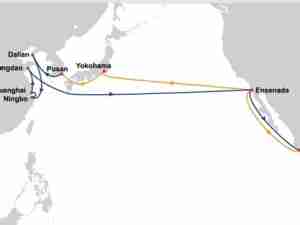Four trade associations representing the international liner shipping industry today submitted comments to the European Commission supporting extension of the EU consortia block exemption regulation (“BER”) for an additional five years beyond its current 2020 expiration date.
The papers were submitted in the public consultation being held by the Commission’s Directorate-General for Competition (DG COMP) by the World Shipping Council (WSC), the European Community Shipowners’ Associations (ECSA), the International Chamber of Shipping (ICS), and the Asian Shipowners’ Association (ASA). The industry comments address a wide range of legal and economic issues, but emphasize several key points:
1. Vessel sharing arrangements are a fundamental part of the structure of the global liner shipping transportation network.
2. The consortia BER has since 1995 provided transparent and practical legal guidance to vessel sharing arrangements for international liner shipping services operating from and to EU ports.
3. Despite recent mergers in the liner industry, the industry remains unconcentrated and highly competitive, with freight rates at half of their levels twenty years ago.
4. In addition to supporting operational efficiency and broader service offerings, the BER helps carriers reduce air emissions and greenhouse gases through higher utilization of vessel space.
John Butler, President and CEO of the World Shipping Council, summarized the industry’s position this way: “The bottom line is that the BER has worked very well for almost 25 years. It sets out clear rules that can be practically applied without the need for extensive legal analysis. This means that carriers can focus on seeking the most efficient transportation solutions without the cost and delay associated with legal self-assessment for these routine operational arrangements.”
Martin Dorsman, Secretary General of ECSA, noted recent developments in the industry, but also observed that the BER remains fit for purpose: “A lot has changed in our industry in the past five years, but the fact is that there is still fierce competition among carriers. The purely operational agreements covered by the BER foster competition by lowering barriers to entry and enabling carriers to compete on more routes.”
Guy Platten, Secretary General of ICS, commented on the relationship between the BER and the ambitious greenhouse gas reduction targets established by the International Maritime Organization and supported by the EU: “A factor that is new in this review of the BER is the fact that the IMO has now set concrete goals for greenhouse gas emissions reductions for the international shipping industry. We will need to use every available tool to increase efficiency, and the BER supports vessel sharing that is a key tool for the liner sector to reduce its fuel burn and therefore reduce its emissions.”
Captain Ang Chin Eng, Secretary General of the Asian Shipowners’ Association, urged the Commission to maintain the BER as an important basis for international legal uniformity: “Many Asian economies/countries have legal regimes that treat liner shipping consortia in the same competitive manner as the EU. It is in the interest of international trade that policies and laws are aligned globally at both ends of the trade route which will provide clear guidance for international shipping.”






